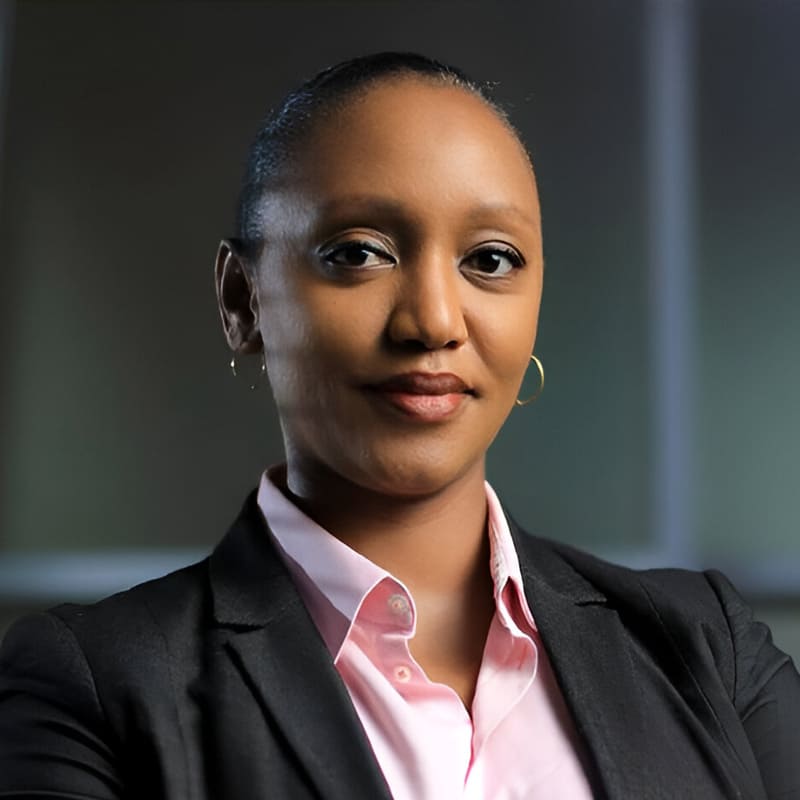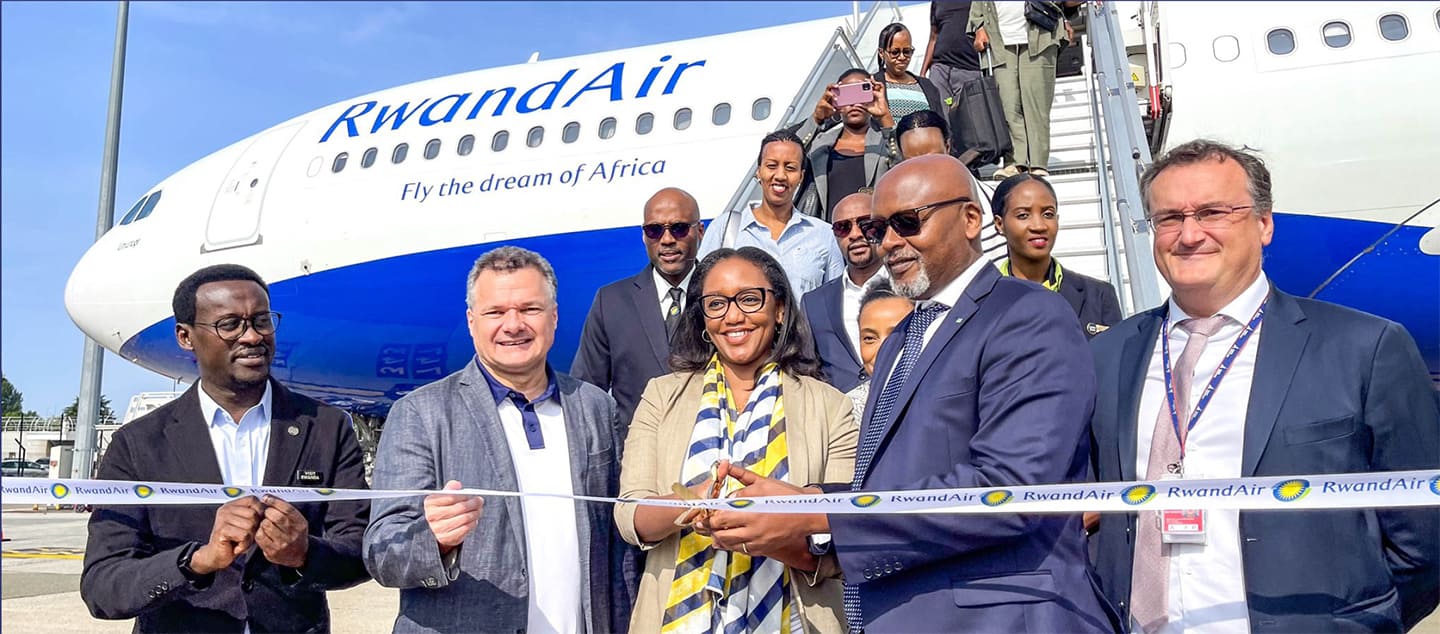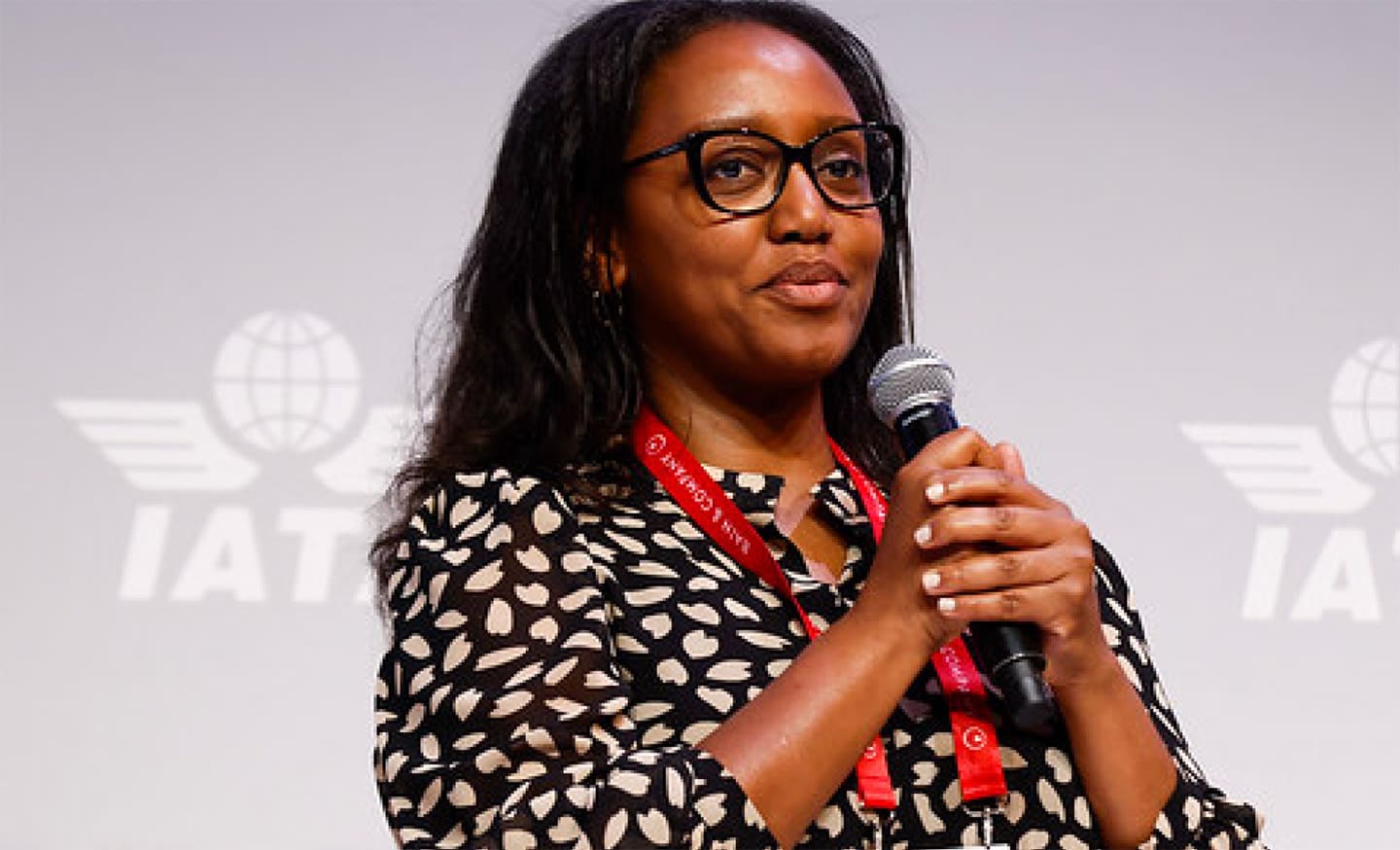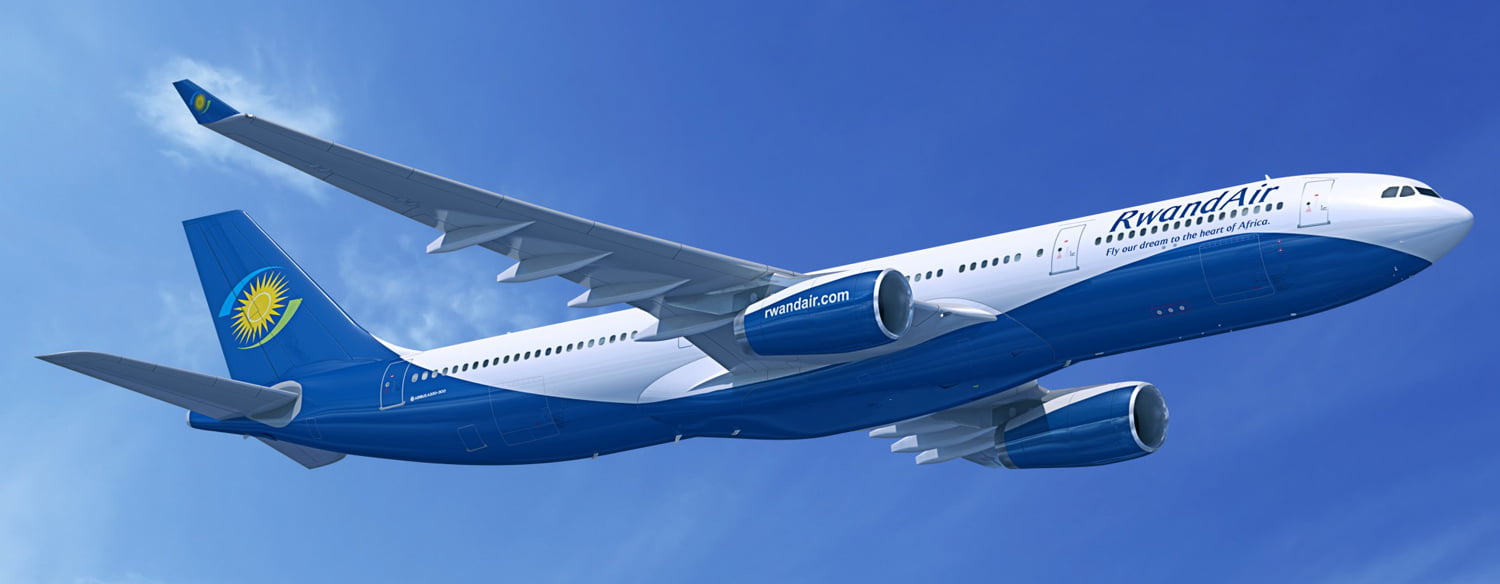On a drive to connect the world
Interview with Yvonne Manzi Makolo, CEO, RwandAir

Yvonne Manzi Makolo, CEO, RwandAir
When you create history, exceptional feats are the norm. It holds good the other way around too – when you have been consistently exceptional, you are expected to create history. Either way you look at it, it works for Yvonne Manzi Makolo, CEO, RwandAir. If anyone expected her to rest on her laurels after proactively – and profitably, even, given the circumstances – guiding RwandAir through the worst challenges of the pandemic, they were in for a surprise.
Soon after air travel opened and things began to look up, she was made the Chair of IATA – the first woman in the history of the aviation regulatory body. While gender equality and Net Zero are all keeping her busy here, her task for the airline is equally cut out – to ensure growth opportunities for the ‘ambitious’ folk in the landlocked country and to raise its own profile on the global platform. Something which will enhance the role of Africa itself in global aviation.
‘The African aviation sector must throw itself to sweeping deregulation,’ Yvonne tells in this exclusive interview to AirWaves, on the need to liberalize the continent’s airspace. She delves deep into many topics of contemporary and huge aviation relevance – new routes and a modern new airport for RwandAir and how overseas airlines must be viewed as potential partners instead of competitors.
Firstly, the obvious but still-relevant question: You piloted RwandAir safely through the pandemic. What are the learnings from this challenging period? How did you brave the storm and emerge from it stronger? In fact, you saw opportunities where not many did – cargo and repatriation, for example.
COVID-19 created an era of unprecedented challenge for the aviation industry and, like many other airlines, we experienced a significant fall in demand as a result of travel restrictions designed to combat the spread of coronavirus. Following the closure of Rwanda’s borders by the government to suppress the transmission of COVID-19, we temporarily suspended all commercial passenger flights on March 20, 2020. This action protected our liquidity as we essentially entered a period of hibernation.
We maintained the country’s links by running cargo-only flights and transporting essential freight, such as PPE equipment and medical supplies. As restrictions continued to ease, we have been able to restart the business, through the phased reintroduction of intra-African flights as demand has slowly begun to recover. At each point, we have taken carefully calibrated steps to protect the business ensuring the health and safety of our customers and crew remained our number one priority.
Following our reliance upon cargo during the pandemic to help the airline through very difficult times, we have discovered a new market for cargo and an increased understanding of its importance for us in the future. Our cargo network provides easy access to the African market with the capacity offered by both our passenger jets and cargo freighters, while the adoption of standard practices has increased the exportation of fresh produce to Europe. Rwanda has long been famous for its coffee and this is a huge export for us. Rwandan blends are becoming increasingly popular across Europe, along with other fresh produce such as flowers.
We also ship significant quantities of garments and fabrics which are in high demand from Rwanda’s thriving textile industry. The import of second-hand clothing has been phased out in Rwanda over the last few years, leading to the creation of new local businesses and increased global export opportunities.
Looking at inbound cargo, pharmaceuticals are one of the biggest imports, including antibiotics, injectable medicines and painkillers for use in the medical sector. Our cargo operations are therefore essential to the supply of high-quality medicine in Rwanda, and beyond. We also import large quantities of construction goods, including building materials, as well as machinery and equipment to support a range of infrastructure projects across the country.
Your background is information technology and you earned your stripes in telecommunication. Soon enough you went on to make your mark in aviation – and continue to do so. How was the transition? Where did the twain meet?
Becoming an airline CEO was not part of my original plan and I originally carved out a career in IT, having moved to Canada in 1993. There I studied and earned a degree in Geography and Environmental Sciences from McGill University and a diploma in Information Technology from the Institute of Information Technology.
In 2003, I returned to Rwanda and worked on a World Bank project with an NGO called World links, to digitise Rwandan schools and train teachers in the use of computers. Three years later, I joined the South African telecommunications company, MTN, in Rwanda where I spent 10 years, rising through the ranks to hold the positions of Marketing Manager as well as Acting Managing Director. That all brings me to where I am today and this year, I agreed to take up the mantle as IATA’s next Chair of the Board of Governors which commenced in June 2023.
I am the first ever female to take on this prestigious duty to help advance the aviation industry within Africa. The transition was good and I am looking forward to being able to further drive forward my passion for encouraging more women to consider a career in aviation.

Yvonne Makolo at the inaugural flight to Paris, operating thrice a week.
Rwanda is a landlocked country relying heavily on aviation for development; a ‘small country but full of ambitious people’ to quote you. It is developing fast and is one of the sought-after MICE destinations in Africa. How much has RwandAir contributed to your country’s growth? What more do you think can be done?
RwandAir has a huge contribution to make the economic well-being of Rwanda by connecting it to not only the rest of Africa but also the rest of the world. But as a small country – and an airline – with big ambitions, we continue to punch above our weight.
As a landlocked country in a continent as vast as Africa, maintaining air links with our neighbours and key trading partners both in Africa and further afield is vital to help power the expanding Rwandan economy. We connect the country to these increasingly important overseas markets and there is a strong correlation between the performance of the airline and Rwanda’s overall economic well-being.
That is why connecting African markets is a significant focus for us, along with all the opportunities it presents.
Thanks to these connections Kigali has become a highly sought-after destination for MICE events and has played host to major conventions which have helped raise our world profile. Just last year, Kigali hosted the prestigious Commonwealth Heads of Government Meeting (CHOGM), held in the country for the first time, bringing together leaders from around the world for this, it was its 26th meeting. Later this year, it will also host the Global Summit of the World Travel & Tourism Council (WTTC) which will act as a global forum for the private sector and again put Rwanda on the centre of the world’s stage. These are just two examples of extremely high-profile global meetings which Rwanda has risen to the occasion to host, helped by RwandAir’s flight connections around the world.
You have always advocated for a Single African Aviation Market. This is even more relevant today as the cost is a big challenge. If the markets open up prices can be brought down and standards improved. When do you see African airlines flying through open skies to meet travel demand?
Primarily, anything we can do to get the cost base down would make African airlines more competitive and allow more Africans to travel. If we look at the pandemic, it isolated Africa and weakened critical links between neighbouring countries, exacerbating existing and significant challenges holding back the development of the African commercial aviation sector. That said, even before the COVID-19 outbreak, aviation in Africa was struggling with its share of global air traffic declining to just 2.5 % compared to 3.5 % in the early 1980s and by some estimates, Africans, who represent 17% of the world’s population, accounted for just 1.9% of air passengers, with global air travel at just 42% of 2019 levels.
With intra-African load factors among the lowest in the world, reflecting both a lack of consumer confidence to fly and affordability, the African aviation sector must throw open itself to sweeping deregulation. The biggest challenge that we face in Africa is high costs. It is the cost of visas, as well as airport charges and taxes on aviation fuel that mean travel within Africa can be extremely expensive and dampens demand.
Evaluating the commercial viability of routes and the level of consumer demand requires a lot of work and in light of that African airlines have struggled to make an impact commercially often being under resourced or not run along commercial lines, which has inhibited growth. Looking at the landscape, the African aviation sector also faces challenges from overseas airlines with designs on the continent’s growing and potential customer base but rather than see them as competitors, it would be better to embrace them as potential partners. This would result in sharing revenues, encouraging inward investment and bolstering an aviation sector which has been under-resourced for far too long.
As the market opens up, competition will increase, in turn driving down prices and improving standards and we have long emphasised the need for a single unified air transport market in Africa – noting the need for more government support for aviation. Now, more than ever we need a single African aviation market. Africa must open up and African airlines must have open skies and be able to fly where they want to meet travel demand.
The African Continental Free Trade Area will help drive trade and demand for business travel in the future, though we must continue to break down barriers to make flying within Africa easier and encourage the growth of more routes. We have to be ready to leverage that opportunity and creating a single African aviation market would provide an even bigger stimulus for customers, countries and commerce.

The codeshare with Qatar Airways has given RwandAir access to a world-class airline and 265 destinations worldwide; it also greatly improves the pan-African offering of QR. Eventually with QR taking stake in WB, what other synergies and benefits do you expect?
It is exciting to work with a world-class airline, like Qatar Airways and we highly value the partnership we have struck with them, which is a strong vote of confidence in RwandAir, which will help us grow and develop in the future. It is too early to talk about what contribution their investment will make but we look forward to working closely with them in the future. However, the immediate benefits are that it enables us to cooperate in a number of commercial initiatives. The codeshare agreement with Qatar Airways is a major achievement, not only giving us access to 265 global destinations but greatly improving Qatar Airways pan-African offering.
As an African airline it’s easy to understand why much of our operations are focused on connecting Africa. But the partnership with Qatar Airways also helps us achieve our loftier ambitions to become Africa’s top hub for connectivity – and to connect Africa to key overseas markets.
Climate change is a big issue in Africa like in the rest of the world. When it comes to aviation, airlines have been singled out as the chief polluter which is not a fair assessment as there are many more stakeholders. Still, airlines are striving eagerly to reduce emissions in a timely, time-bound manner. What more do you think can be done towards Net Zero?
The Fly Net Zero pledge brings air transport in line with the objectives of the Paris agreement to limit global warming to 1.5°C. RwandAir remains absolutely committed to protecting the environment as much as we are committed to our passengers, working in collaboration with the industry in global efforts to reduce CO2 emissions to tackle climate change, and we constantly strive to meet global and local environmental compliance obligations and other requirements.
In order to achieve all this, we are consistently streamlining our operations to the modern industry standards in fuel optimization by minimizing waste and consistently identifying opportunities to reuse or recover materials for other purposes applying the principles of a circular economy across our business. We also meet industry best practices for noise and air quality, with modern aircraft with quieter engines, and we comply with noise abatement procedures wherever we operate.
RwandAir has a zero-tolerance to the transportation of illegal wildlife and their products. International aviation is regularly targeted by traffickers to unknowingly transport endangered wildlife. In response to this global threat, RwandAir is committed to: Raising awareness, improving detection in collaboration with different authorities, and Sharing information and best practices within the industry.
You initiated a slew of cost-cutting measures in RwandAir which are expected to prove beneficial in the long run. Like automation, an aviation academy to train local pilots and an MRO to name some. How are they turning up? What other plans in the direction?
The pandemic provided the opportunity for RwandAir to take a hard look at itself, not only to streamline the business but to make it fit to fly in the future. We used it to rationalise our operational structure and looked carefully at future investments to reduce our costs. This was essential to future growth plans.
In regard to the Aviation Academy that trains local pilots, it has reduced costs that were usually spent for external academies to train our own students. The cost spent on these local pilots comes back and rebuilds our country hence not only cost-cutting but also beneficial to our country. MRO, in fact, if we were used to sending our aircraft externally for repair and now, we are doing it by ourselves, it saves us so much money. Other plans include automating all RwandAir services for easy access by all our clients globally and focusing on introducing an online learning platform as a strategy to boost staff capabilities within RwandAir Ltd.
Your elevation to the top spot at IATA has put the spotlight on you. With great power comes great responsibilities – and immense pressure. What changes can one expect with you helming the Association?
My role as IATA’s Chair of the Board of Governors commenced in June and I am pleased that it will not only help advance the aviation industry within Africa but that I will be able to further drive forward my passion for encouraging more women to consider a career in aviation.
The industry continues to emerge from our worst downturn and while pent up demand is being realised, as a board, we will need to focus on maintaining that momentum. It’s certainly going to be a very busy and interesting time over the next twelve months for us.
As the Chair of IATA’s Board of Governors, high on my agenda are decarbonisation, improving safety, the transformation to modern airline retailing, and ensuring we have cost-efficient infrastructure, alongside raising the visibility, reputation and influence of African airlines in the global aviation industry.

You come from Rwanda where women are an empowered lot who already represent over 60 percent of Parliament and 50 percent of cabinet. IATA’s ‘25by2025’ is a wonderful initiative definitely in highlighting the need for more women in aviation jobs. Any specific thrust from you towards this?
Gender diversity in the aviation industry is something that I am incredibly passionate about. It’s an issue which is widely accepted across the industry and needs addressing. In an ideal world, the fact that I’m a female CEO, particularly in the aviation sector, should be unremarkable. But that’s not the case. I stand out as being one of the tiny four per cent of airline CEOs who are women.
I would much prefer that my being a female CEO was commonplace, especially in aviation. Looking at the sector as a whole, over the last few years, we have taken considerable steps to address gender imbalance.
Organizations like IATA are actively implementing solutions, so I look forward to seeing more women in leadership positions in every segment of the aviation industry. However, I strongly believe a lot more work needs to be done; not only to bring more women into our industry, but also to improve the speed at which we do so. At RwandAir’s academy, we see it as part of our mission to encourage young women to take up entry-level positions in aviation – including in technical roles such as engineering, or as future pilots. I am very happy to continue this drive, as CEO of RwandAir.
While positive inroads continue to be made to redress the imbalance of women being represented at top levels within the aviation industry, clearly more can – and should – be done to encourage a proper gender balance. We must do what we can to continue encouraging greater numbers of women to work at the highest levels within aviation.
